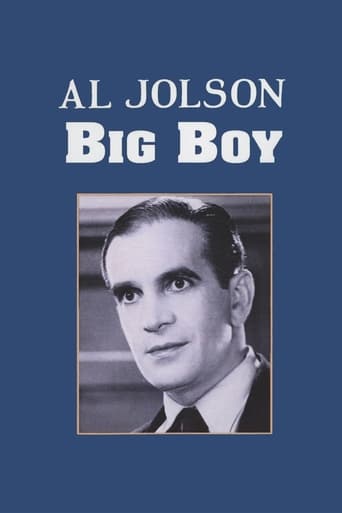mark.waltz
Off camera for possibly only a few minutes during this film version of one of his biggest Broadway hits, All Jolson does all he can to worm his way into the hearts of his fans. His schtick may fate but the urge to smile at least is always there. Even his now taboo if black-face us forgivable, a part of a by-gone era that can never return. When he breaks into traditional Negro spirituals, it is as if his whole soul has been taken over by some spirit of the past, crying out for peace. His rendition of "Tomorrow is Another Day" must have been pretty potent stuff for depression era audiences, and the passion in his singing still strikes today. It is a shame, however, that all movie audiences got with this was an obviously truncated version of what he had done on stage, and it is not memorable for anything else but Jolson's singing.The slight story concerns an alleged Creole stable boy who works past his station, eventually becoming a singing waiter (again!) and later a jockey in the Kentucky Derby. Such respected players as Claudia Dell, Noah Beery and Louise Closser Hale stand up with their dignity intact, but as he admits even here in the script, if you are what you eat, then he is the Easter ham to end all Easter hams. Still, ham sliced thin makes for an awfully nice sandwich.
louisb-399-524629
Big Boy was a complete shock to me, a 1930 picture that was vibrant, funny,bizarre and very entertaining. I bought it expecting to see a train-wreck,a politically-incorrect minstrel show featuring a white actor performing in black-face. Not just for a scene or two mind you, but for the entire picture(save for the very end)!!! What I got was a fabulous performance by Al Jolson,who is frankly so good here it's almost scary. He's funny, charming, sings wonderfully and performs with a sort of wink-wink to the audience, as if he knows he's in a ridiculous situation as an actor and wants everyone else to know it. His asides are often hilarious,and frankly he is so good overall that if he had chosen to play the part in normal black makeup, without the exaggerated lips common with black-face, I honestly think he would've disappeared into his role completely and truly transcended his makeup. The plot is almost completely beside the point-it exists simply to provide a frame-work for a series of wonderful musical interludes.There is one extended flashback sequence that appears almost out of nowhere, and is so wild and broadly played that I don't think anyone who sees it will ever quite forget it. Print quality is sometimes excellent, and often-times poor. This picture is in definite need of some restoration. I have to applaud those who decided in this sensitive age to release a movie as bizarre and potentially offensive as this one,and I'd like to think that it's because they trust us to be adults and apply some context to what we're watching. If the very idea of black-face portrayals offend you, this picture is to be avoided at all costs. If you can place the use of it into a proper context, this picture might still offend you, but at least you won't keep yourself from watching a wonderfully bizarre and surreal little curio. The ending to my mind is fabulous,by the way.
billcarpenter
I was fortunate enough to see this film on the big screen (as all great film stars should be seen) almost 20 years ago and it was one of the most thrilling film experiences I have ever had.Despite the film being politically incorrect in this day & age it is a great testament to all the performers who appeared in the beginnings of the sound revolution.Al Jolson appeared as Gus the main character (& the role he actually played on broadway many times in different productions)in this play that was literally filmed on the stage.If anyone with an open mind sits through a showing of the film, I'm sure that they would appreciate the 'rough' basic performances and the contribution they made to film history.
lzf0
Now the movie is far from politically correct. But it was made in 1930! Jolson is at his funniest. Sure, he's in blackface for almost all of the film, but this film serves as an historical recording of one of Jolson's biggest Broadway successes. Many people lump Cantor and Jolson together as similar type performers because both did blackface routines. But where Cantor played the scared little man (and played it very seriously, making it all even funnier), Jolson played the aggressive braggart. Jolson's Gus is a wise cracking schemer. His Gus is no Uncle Tom! Jolson is often the butt of the joke and this is a good thing. It softens his aggressiveness and makes him more human. I am only glad that with his massive ego, Jolson allowed himself to be the butt of jokes. The final punch line of the film is side splitting and is a wonderful inside joke. We need to look at these films with a 1930s mentality. We have advanced greatly in the area of tolerance, but we should not condemn performers like Al Jolson and Eddie Cantor who were only appealing to the popular tastes of their time.


